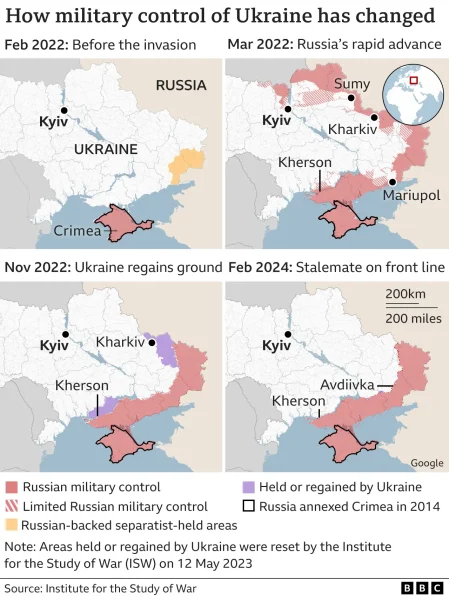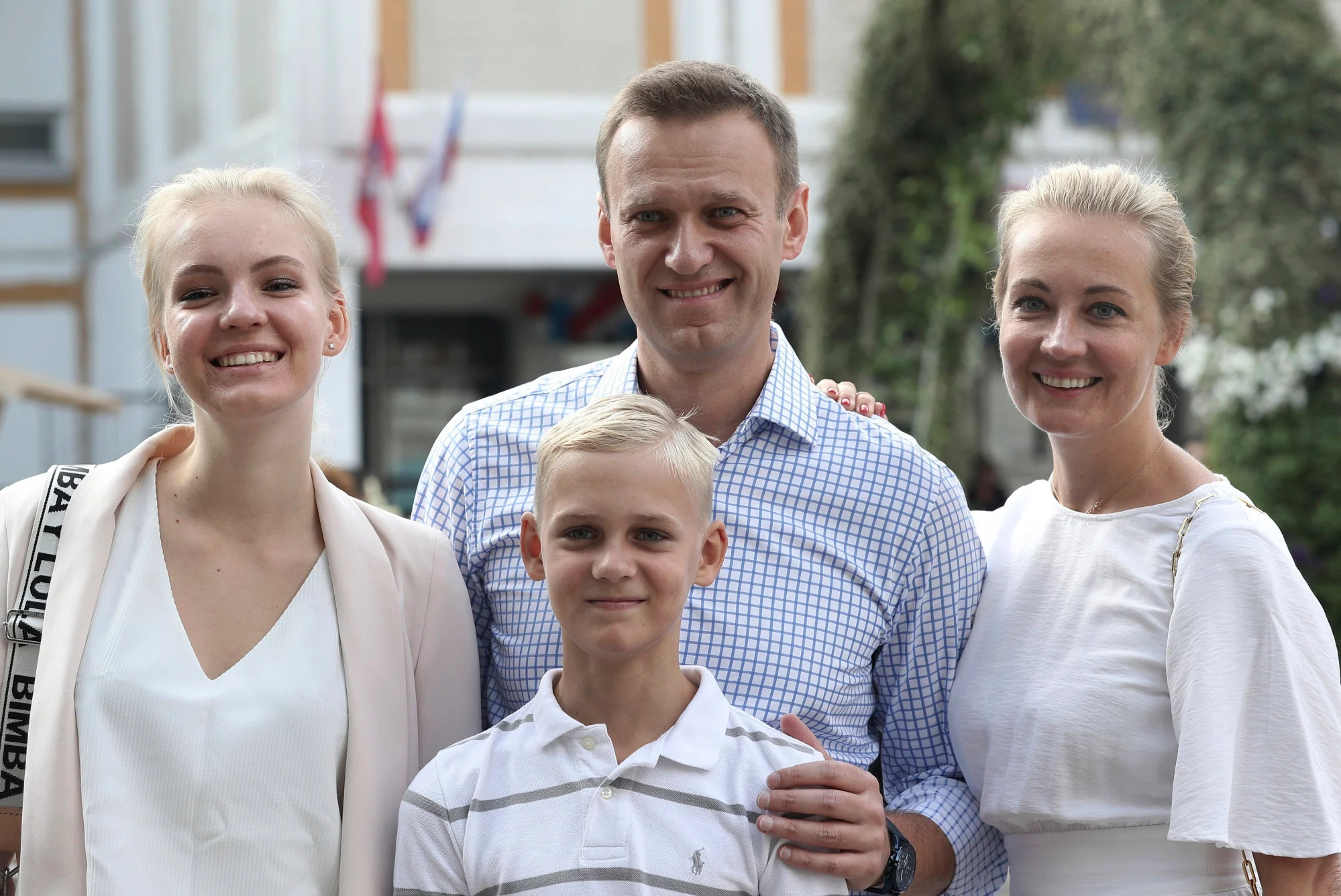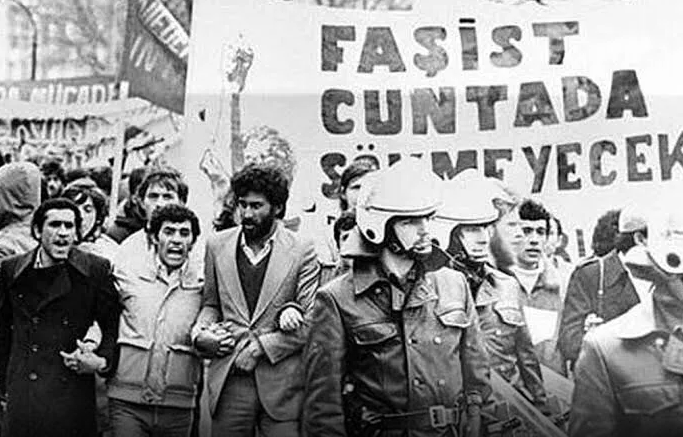On February 16, 2024, the death of a 47-year-old political activist who was imprisoned in Russia fled the media, with his funeral even being covered in American news. But this wasn’t just the death of anyone. This influential politician was Alexei Navalny: Russian President Vladimir Putin’s fiercest foe. Navalny’s death has stirred the pot of the ongoing conflict between Russia and Ukraine, but what exactly happened to him? And what impact does his death have on the Russo-Ukrainian war, if any?
History
Russia and Ukraine have been at odds for decades. In a more modern context, however, their dissension erupted in 2014 when Russia annexed the Crimean Peninsula in the south of Ukraine and the Donbas region located on the countries’ shared border.

In February of 2022, their conflict intensified into a full-fledged war that the New York Times calls the “biggest war in Europe since World War II.” While both countries are facing intense chaos and many casualties, Ukraine has continuously been attacked, invaded, and bombed through brutal missile strikes and nuclear weapons for the past 2 years. The country has been destroyed to the point that it will no longer be the same.
Alexander Kovalenko, a Ukrainian AAST sophomore, spoke with the Academy Chronicle based on his personal experience and perspective on this conflict. “The people that I knew in Kharkiv have mostly all moved to other parts of the country, for urban areas (especially Eastern ones) are active warzones. The literal kindergarten building next to my old apartment in the city was destroyed by a missile.”
Throughout these two years of war, Ukrainian president Volodymyr Zelenskyy stated that Russia has been responsible for 31,000 Ukrainian soldier casualties, and millions of people have fled to other countries for safety. It is unclear as to exactly how many total civilians on both sides have died from the conflict, but it is an undeniable fact that millions of people across the globe have been negatively impacted by the effects of the Russo-Ukrainian war.
According to the official website of Ukraine (ukraine.ua), the leaders of Russia have been seeking to restore “historical Russia” since the collapse of the Soviet Union in 1991, and Putin has “spared no effort to promote the false historical narrative that Ukrainians and Russians constitute ‘one nation.’” The website further explains that Russia is a terrorist state that finds itself unable to coexist with a country that upholds “the very essence of freedom,” which has led it to fully invade Ukraine.
“Russia, with all the sanctions on it,” said Alex, “won’t run out of people or equipment soon because it’s being backed by China, Iran, and India among others.”
Navalny’s Background
Recently, the news has been flooded with information on Alexei Navalny and his death in a Russian prison, but who even is he? Does he relate to the ongoing war?
Navalny grew up in a town near Russia’s capital, born to a Russian mother and a Ukrainian father. He graduated college in Moscow for law, and by 2001, he earned a degree in economics. Although he was a lawyer by trade, Navalny became a prominent political figure and activist when he began to express his opinions on his blog that targeted the corruption of Russian society.
Navalny led anti-corruption protests, campaigns, and projects throughout his entire life, even before the Russo-Ukrainian war began. In as early as 2004, he gained attention by forming movements against overdevelopment in Moscow, and throughout the years, he continued to advocate against corruption seen behind important political leaders, state-run operations, and state agencies.
As noted by AP News, Navalny notably founded the Foundation for Fighting Corruption to expose “alleged graft among Russia’s top political ranks,” led mass protests against rigging in parliamentary elections, publicly accused leaders of corruption where he saw fit, opposed the residence of primary power known as the Kremlin, and much more. His leadership throughout his projects and dedication to his cause allowed him and his team to form a base of activists who achieved many successes and failures, in an attempt to reveal the reality behind Russian corruption.
Navalny’s influence in Russia came with a special set of challenges. In his work to expose aspects of Russian politics, Navalny had been arrested, charged, and suspended numerous times, according to AP News. He was accused of fraud and other claims in specific cases, and even though he held a significant impact that helped him gain many supporters, he did not retain the full support of everyone in the country. Navalny was poisoned a number of times and accused the Kremlin for being behind such attacks, but Russian officials denied all accusations.
While he had been in prison many times throughout his life, Navalny was accused of extremism and sentenced to 19 years in prison as of August 2023. His location was initially unknown, but Navalny was imprisoned in the center of Russia before being transferred to a prison colony above the Arctic Circle in a penal colony in Kharp.
“The conditions [in special-regime colonies] are quite terrible,” human rights activist Igor Kalyapin told The Moscow Times, “[and] it is clear that this is detention in maximum isolation.” Such establishments torture prisoners, both psychologically and physically, according to The Moscow Times. Navalny’s colleague, Maria Pevchikh, claimed that negotiations were made for a “prisoner swap” between Navalny and two citizens from the United States, but BBC is unable to verify these claims.
On February 16, 2024, it was announced that Alexei Navalny died. Medical officials revealed that Navalny felt unwell after a walk and lost consciousness, to which ambulances immediately arrived, according to Reuters. However, it is unclear as to what the exact cause of death is. The director of Navalny’s Anti-Corruption Foundation, Ivan Zhdandov, stated that Navalny’s mother and lawyers were told that he died from sudden death syndrome, which is a broad term used to describe unforeseen biological mishaps that can occur spontaneously.
“I believe that Alexei Navalny’s death is just a reflection of the Russian ‘democracy,’” said Alex.
“With presidential elections coming up in March, most of the anti-war opposition has been barred from running due to mysterious errors in their campaign management.” Another anonymous Ukrainian student similarly believes it is “not a coincidence that Navalny randomly passed away from a sudden cardiac arrest.”
Influence on the Russo-Ukrainian Conflict
Alexei Navalny and Ukraine had a common aim in exposing Russia’s faults and defeating the corrupt aspects of Russian society, as evident through Navalny’s political activism and Ukraine’s unwavering efforts to win the war. However, sharing common ground doesn’t make things all that simple.
Some Ukrainians see Navalny in a neutral lens, while others feel bitterness towards him. In October of 2014, an important statement made by Navalny was one of the reasons for Ukrainians’ distrust of him. After Crimea had been annexed by Russia, Navalny made a comment on the annexation during an interview on the Echo of Moscow radio station that took some supporters and fellow oppositionists by surprise. According to Suspilne Crimea, Navalny stated that he would not return the island to Ukraine if he were president and asked, “Crimea is what, a sandwich with sausage to be returned here and there?” His anti-war position was supposedly created out of “economic, rather than moral, considerations” according to Al Jazeera, and he viewed “Russian people as victims of injustice under Putin’s regime, not the Ukrainians.” Many Ukrainians feared that if Navalny would rise to power in Russia, “Ukraine would no longer matter to Western leaders if they had someone nicer than Putin to talk to.”
“I do not think [his death] will change much,” said a BCA student. “He might have been one of Russia’s fiercest opposition leaders, but that does not mean he was a supporter of Ukraine.”
“As much as he is trapped in prison, Navalny is trapped in his identities,” stated the Washington Post. Navalny has a “long and contradictory” history with Ukraine, since he is “horrified on a deeply personal level” from the war causing so much destruction to the country he used to visit in his childhood. While he stated that Crimea cannot be returned to Ukraine simply, Navalny emphasized that the capture of Crimea was a “harmful violation of international agreements” according to Suspilne Crimea. Navlny’s team published a 15-point manifesto that was meant to clear the air about their position on the war, acknowledge Ukraine’s borders, and describe a need for Ukrainian sovereignty. The manifesto also insisted on withdrawing Russian troops and investigating war crimes, according to Al Jazeera.
Navalny’s position when it comes to Ukraine is ultimately a complicated one. Will his death prompt people in Russia, or the West, to do something? Will his goal of fully eliminating the corrupt Russian regime eventually be achieved? Do other oppositionists have enough power or will to do anything? These questions still remain in the air, as their answers are held in the future for us to find out.
How BCA Students Can Make a Difference
While America is on the outside looking in, there are many ways BCA students can make a difference for Ukraine. Not all of us want to, or have the ability to, be involved in the politics of the countries’ conflict, but donating to Ukraine is one of the best ways you can help. Online, you can make money donations to organizations such as the American Red Cross (redcross.org) or UN Crisis Relief (crisisrelief.un.org), who both work towards providing immediate relief in terms of food, shelter, and safety overall. If you’d like to get involved in a more hands-on way, Baranova 27 (baranova27.org) is a charity in Fort Lee that pursued a project, “Baranova 27 Villages,” which developed a community of shelters in Ukraine for those in need. This initiative accepts online and in-person donations, but it also offers volunteering opportunities for those interested.
“With so much going on in the world today, it is easy to forget or even become indifferent to the war,” said Alex, “and the most important thing to do is to make sure that we don’t.”
The Russo-Ukrainian war has been ongoing for over 2 years so far, and there is currently no clear end in sight. That’s 2 years of destruction, 2 years of chaos, 2 years of families being torn apart, and 2 years of people losing their lives each day. We can’t wait for an end to the conflict or simply ignore the issue, we must do what we can to lessen the drastic impact millions of people have experienced across the world.








